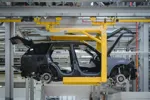By Professor Jim Saker, director of the Centre for Automotive Management at Loughborough University's Business School
A few years ago I attended one of those less than informative manufacturer organised dealer meetings where the network was invited to listen to the latest wisdom to come from head office.
As usual, the power point slides produced by the agency looked slick, the lighting worked well and the mandatory contemporary music introduced the suited middle-aged speaker.
The first topic was customer satisfaction and the announcement was made that the franchise customer satisfaction index had gone up by a whole five percentage points in the past year. There was wild applause and self congratulation until it was pointed out on the next slide that sales and profitability had gone down by an even larger percentage.
Our industry spends a fortune producing and collecting customer satisfaction data. Dealerships are often rewarded against this metric so do their best to fix the figures to get the bonus. Techniques include offering a bottle of wine to the customer if they are ‘completely satisfied’. Even if the satisfaction score was a real measure, is satisfaction the right thing to be measuring?
Is customer satisfaction worth measuring?
Satisfaction is a weak emotion. The research shows that being satisfied is not a key driver of repurchase or retention at anything but possibly the highest level. This is why manufacturers drive towards wanting people to be completely satisfied in the mistaken belief that the customer will come back and repurchase.
If we think about our personal relationships, I am sure there are many times that completely satisfied is not
a realistic description. Personal relationships go on despite a lack of satisfaction – couples and families stay together despite what, if measured, would be low satisfaction scores.
It is self-evident that the nature of the relationship is critical. In a personal situation it might be based on love or friendship. The quality and depth of the relationship is a far stronger pull than not being completely satisfied.
The issue is that some satisfied customers are promiscuous while some dissatisfied customers stay loyal despite their dissatisfaction.
A cynic might suggest that some personal relationships are based on economics – eg ‘I am still here because I can’t afford to leave’ or ‘I am better off financially here’. In reality, this is not that dissimilar to the car sector where maybe warranty or some purchase payment scheme ties the customer into the dealership.
One of the key issues we need to address is that our satisfaction surveys should be sophisticated enough to be able to measure the depth of the relationship, not just our satisfaction with it. Without this dimension, we are only looking at half the story and, as a result, can produce misleading information that indicates that we are doing better than we really are.
Some manufacturers and dealer groups are becoming more sophisticated in their approach to this subject, including the ‘Trip Advisor’ type of customer feedback. In the US, measures are being built into the KPIs for both manufacturers and dealers that give bonuses for high retention irrespective of satisfaction.
Happiness doesn’t equal loyalty
A number of dealers have asked why it is that some of their most loyal and established customers have gone off and purchased elsewhere. The customers had been with the dealerships for years and had seemed very happy. The answer really stems from the fact that relationships change over time and that often our most vulnerable customers are our most established. The industrial marketing literature throws some light on this.
At the start of any relationship, uncertainty is high and commitment is low. As the relationship progresses over time, uncertainty comes down and commitment goes up.
The question is: when do relationships break up? The research and personal experience reveal that relationships break up when uncertainty is high and commitment is low. This is fairly obvious but the more interesting phenomenon is when relationships break when commitment is high and uncertainty is low.
In reality, the relationship becomes institutionalised and sentiments like ‘you’re taking me for granted’ start to be expressed. These are the warning signs in a marriage/partnership, but these are not articulated by dealership customers – they simply go elsewhere.
The challenge of keeping a relationship alive is an issue in both life and business.














maindealerdiscount - 13/09/2012 16:46
I found that a very interesting article. I'd ask 'why is Ryan Air so successful even though when I fly with them my satisfaction ranges from **** to OK?' I believe customer relationships with dealers are changing due to financial pressures. Just like it would strain a marriage. Uncertain economic outlook changes behaviour. Ryan Air works because it is 'price point'. In these difficult times perhaps dealers should be schmoozing the relationship with the customers wallet a little more and not so much their heart and mind - that will follow when they see an invoice that matched their expectations.